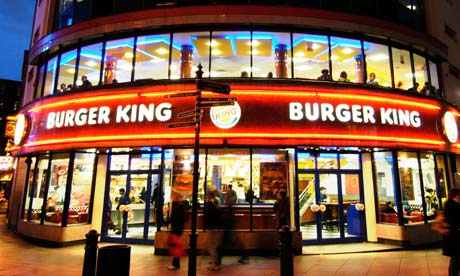
Burger King has revealed that some of its burgers were contaminated in the horsemeat scare, as the tainted food crisis threatened to undermine the confidence of consumers, and major retailers tried to protect their reputations.
The fast food company – whose products were not tested in the food standards checks by Irish authorities that sparked the furore – moved production from the Silvercrest plant in Ireland to Germany and Italy as a precaution. On Thursday night it said test results at the plant revealed "very small trace levels" of horse DNA in its products, but burgers taken from restaurants had tested negative.
As governments in Ireland, the UK and Poland, where a supplier used by Silvercrest for a year is thought be the source of the contamination, continued their investigations, Burger King admitted that, contrary to previous assurances made to it by Silvercrest, it too had now been linked to the scandal. Authorities insist there is no health danger to consumers.
Meanwhile Aldi UK became the first major retailer to suspend its contract with a British plant, Dalepak Hambleton in North Yorkshire, which, like Silvercrest, is part of the ABP Food Group, pending further investigations into why three of nine newly tested burger samples had traces of horse and pork DNA. The products were from stock withdrawn in recent weeks as a precaution but made since October, the company said.
The Aldi announcement came a week after tests at Dalepak for ABP and the UK Food Standards Agency had come back negative for horse DNA. The FSA has also previously suggested that its investigations into Dalepak were concentrating on events before October.
Aldi in Ireland has terminated its contract with the Silvercrest plant in County Monaghan where Burger King, Tesco, the Co-op and Asda have all pulled out.
Burger King said: "Our independent DNA test results on product taken from restaurants were negative for any equine DNA. However, four samples recently taken from the Silvercrest plant have shown the presence of very small trace levels of equine DNA. Within the last 36 hours, we have established that Silvercrest used a small percentage of beef imported from a non-approved supplier in Poland. They promised to deliver 100% British and Irish beef patties and have not done so. This is a clear violation of our specifications, and we have terminated our relationship with them."
Diego Beamonte, vice-president for global quality at Burger King, said the company was "deeply troubled by the findings of our investigation and apologise to our guests, who trust us to source only the highest quality 100% beef burgers. Our supplier has failed us and in turn we have failed you".
Beamonte was cautious about answering questions about whether customers might have been exposed to contaminated meat previously because of Silvercrest practices.
"Testing for equine DNA is not a standard practice used in beef production" he said. But the company would look at whether additional checks including DNA testing and enhanced controls to trace food through production were needed. "We will dedicate ourselves to determining what lessons can be learned and what additional measures, including DNA testing and enhanced traceability controls, might be added," he said.
"We received our negative results last week and were advised of the Irish Department of Agriculture's final results this week.
"As you know, ABP and the Polish supplier are subject to an ongoing investigation by the authorities and Burger King continues to support this process. What is clear now is that the January sample which never left the factory tested positive for trace amounts of equine DNA whilst the December sample which was distributed to restaurants tested negative for equine DNA."
All the major supermarkets, including those not implicated in test results by the Food Safety Authority of Ireland published on January 15 which started the scare, withdrew from sale products made at the two ABP plants and Liffey Meats as a precaution.
But Waitrose, which has since restocked, and Sainsbury's, which both use Dalepak, never suspended their contracts there. Aldi UK said one sample of three of its Oakhurst Beef Quarter Pounders had been found to be o.1% pork and 0.1% equine DNA. One Frozen Oakhurst Beefburger 16 pack showed 0.1% equine trace and a similar amount of pig was found in a Specially Selected Aberdeen Angus Quarter Pounder. These were all from stock withdrawn from sale but made since October. A spokesman for Aldi said: "We are deeply angry and feel let down by our supplier and we are pursuing more tests until we are certain that we understand how the production line was contaminated."
Labour called on all supermarkets to introduce routine testing to check that all cheap pork, chicken and turkey products as well as beef were not contaminated by other animal sources. Huw Irranca-Davies, the party's food and farming spokesman, said: "The major supermarkets and processors have a duty to their customers to DNA-check all value-meat products to restore confidence in the supply chain, which has been badly damaged by this scandal. Retailers need to reassure consumers about what checks are being undertaken."
Silvercrest, one of the biggest burger plants in Europe, employing 140 people and normally producing 200m burgers a year, is closed for deepcleaning and a change of management. ABP continued to apologise for its part in the affair.
DNA testing and other inquiries are continuing in Poland. In all, 21 pallets of frozen trimmings, made up of beef and horse off-cuts, are thought to have been delivered to Ireland by a Polish company running a cold store in the centre of the country. It had taken meat from five slaughterhouses, not owned by that company and not licensed to slaughter horses. The identity of these plants has not been revealed.
The legal import of horsemeat to Britain is tiny, 30 tonnes last year from all sources. Poland's contribution was 9kg of offal last year, compared to 1kg of meat in 2011.






